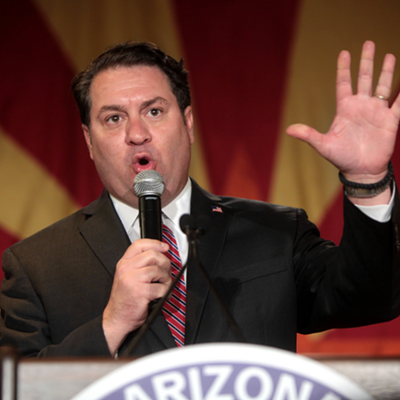WHY DOESN'T ANYONE LIKE THE RYAN PLAN?
We'll see soon enough whether Mitt Romney's selection of Paul Ryan will bring the fabled game-change to the presidential sweepstakes, but we agree with the pundits who say that the selection of the Wisconsin congressman will sharpen the race.
Up until now, Romney had been able to campaign against President Barack Obama by pointing out the ongoing economic challenges faced by too many Americans these days, with the hope that people would blame Obama for their troubles rather than a gridlocked Congress.
Romney had gone so far as to boast that his own tax plan simply couldn't be scored—it was so dynamic that the positive impact was impossible to predict. (The vague details didn't stop the Tax Policy Center from scoring it a few weeks ago based on the basic principles, and concluding that, even if it worked in the most-positive way that Romney hoped, it would end up cutting taxes for the wealthiest Americans, and raising them for the middle class.)
But now the Romney campaign has little choice but to embrace the Ryan budget plan, which is a dramatic reordering of the social contract in America. Under the Ryan plan, Medicare would move to a voucher system for those who wanted private insurance; almost every other function of the federal government outside of the military would be sharply scaled back; taxes on the wealthiest Americans would be dramatically cut; and, if all goes according to plan, sometime in the 2030s, the budget would be balanced.
Admittedly, this is a fairly succinct description of the plan; you can sleuth out the details for yourself on the Internet. But one element that we're particularly astonished by, in terms of sheer audacity, is that the Ryan plan keeps the $500 billion in "Medicare cuts" that the Republicans have been relentlessly hammering Democrats on for the last two years. (We put "Medicare cuts" in quotes, because it's a bogus argument to begin with—and it becomes even more bogus when the GOP budget plan keeps the so-called "Medicare cuts" in place in order to deliver tax cuts.)
Romney appears to recognize that political problem, given that he is already trying to distance himself from Ryan's budget plan, and saying that he does not support the Medicare reductions that are part of it.
The Ryan plan is not a particularly popular plan with voters once they learn the details. A pro-Obama Super PAC, Priorities USA Action, noted in a polling memo earlier this week that when they explain what the Ryan plan would do, "many voters simply did not believe it. The underlying assumption was clear: No frontrunner for a major party's presidential nomination could support such an extreme proposal."
While it has passed the House of Representatives with GOP support, the Ryan budget plan has been a toxic document among Southern Arizona Republicans. The Tucson Weekly is the only publication in Southern Arizona that has bothered to ask congressional candidates whether they would have voted for the Ryan plan earlier this year. Of the ones we've asked, only state Sen. Frank Antenori had the guts to say he would.
Two-time loser Jesse Kelly, although he supported Ryan's earlier budget proposal in 2010, sidestepped the question when we asked it. National Republican Congressional Committee spokesman Daniel Scarpinato, who came to town with the fool's errand of trying to help Kelly win June's special congressional election, claimed he didn't know enough about it to be able to answer questions.
When we quizzed current Congressional District 2 candidate Martha McSally on the Ryan plan, she first asked the question that is on the mind of many Americans this week: "Who's Paul Ryan?" A few weeks later, once she figured out who Ryan is, she also sidestepped the question, although she said she supported "many elements of the plan."
Congressman Ron Barber, who is going to face McSally in November (barring some utterly unexpected upset in the Aug. 28 primary), opposes the Ryan plan.
"The impact would be to end Medicare as we know it," Barber told The Skinny earlier this year. "The most-healthy people will go (to the private insurance companies), and the program will be left trying to serve the people with the most health needs, which will make it a more-costly program and will not help solve its solvency problems down the road."
STRANGE BEDFELLOWS
A national group of rich Republicans recently dished out more than $19,000 in one of Tucson's legislative races to defeat a longtime Democratic incumbent—by funding her Democratic challenger in the primary election.
An independent expenditure committee called the American Federation for Children sent out a mailer supporting Maria de la Luz Garcia, the widow of former Senate Democratic leader Jorge Garcia. She is running against Sen. Olivia Cajero Bedford in westside Tucson's Legislative District 3.
The organization is headed by well-known conservative billionaires, has ties to the conservative American Legislative Exchange Council (ALEC), and pushes mostly conservative candidates in elections. For example, it spent more than $20,000 supporting former Arizona Senate President Russell Pearce in his recent recall election, and another $12,000 supporting Tucson's own version of Pearce, Sen. Al Melvin, in his last election.
So when the organization sent out fliers supporting Garcia and touting her record of fighting for jobs, it left some Democrats wondering what kind of company she's keeping.
"It's insulting to think I have anything in common with (Pearce and the like)," Garcia told The Skinny. "I have nothing in common with them."
Well, Garcia does support the state's school-voucher program for charter and religious schools.
The American Federation for Children is a "leading national advocacy organization promoting school choice, with a specific focus on advocating for school vouchers and scholarship tax-credit programs," according to its website. But you wouldn't know that from looking at the flier, which doesn't mention school choice at all, and instead focuses on jobs.
The flier also tries to appeal to Democrats by taking a broad swipe at the Republican-led Legislature, saying the body has "shown a flagrant disregard for our communities, our families, our jobs."
The American Federation for Children has been raising eyebrows in Wisconsin by using the same tactics of supporting pro-voucher Democrats in primaries in safe Democratic districts where no Republican will get elected.
Garcia received an independent expenditure of $5,520 in support from the group on Aug. 3, and another for $13,820 on Aug. 9.
Garcia said she filled out a questionnaire from the group and hasn't had any contact with them since. She didn't know the group's background at the time, she said, and she didn't ask them to spend any money to support her.
As a parent, she sent her kids to public schools in the Flowing Wells Unified School District, and was always involved in their education—even moving them from one public school to another when the first didn't meet her standards. Still, she said she doesn't buy the Democratic line that tax credits and vouchers for charter schools detract from the public school system.
"I would prefer, of course, that the public schools did better, but it's just not there," she said. "As a parent and as a grandparent, we cannot sacrifice our children. If our school system is inadequate to educate our children, then you have to have other options."







